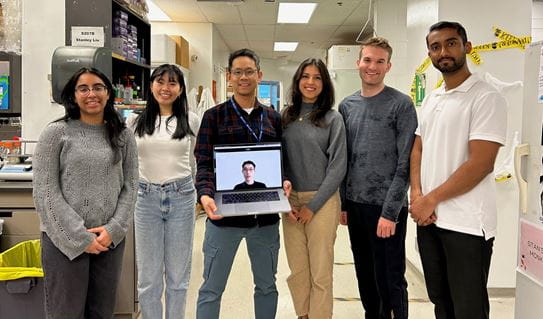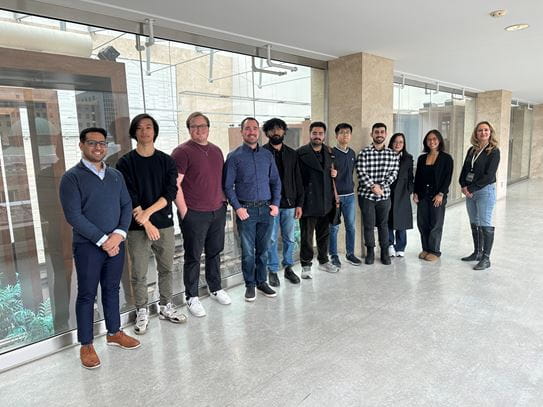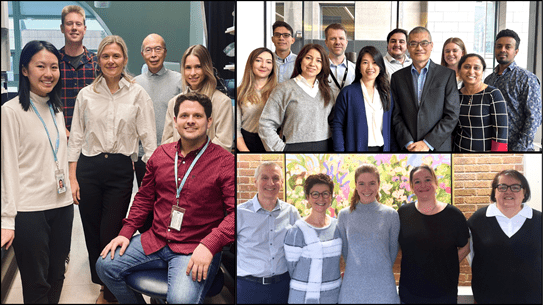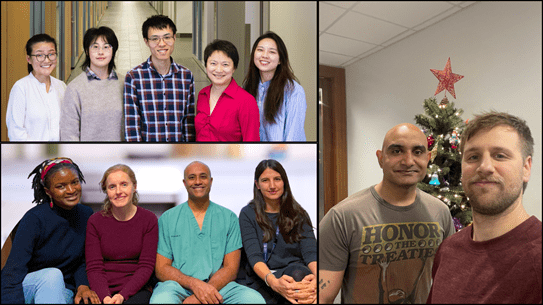The rapid advancement of emerging technologies has seen more and more cancer researchers turning to artificial intelligence (AI) in recent years in the hopes of leveraging its promising power to save and improve lives.
From having the potential to detect and prevent cancer, to personalizing cancer treatments, AI can improve the efficiency and quality of care as well as outcomes for people facing the disease. That’s why the Canadian Cancer Society (CCS) is investing in cutting-edge research into the applications of this evolving technology.
Below is a selection of 4 CCS-funded projects aiming to transform research and maximize impact with the help of AI.
Detecting oral cancer earlier

Although Dr Jesse Chao made his foray into AI much later in his career, his early training as a cell biologist lent him some unique perspectives in AI design and development. Today, the Sunnybrook Research Institute scientist is applying AI towards biomedical image analysis in the study and diagnosis of cancer.
With a CCS Challenge grant, a team of researchers led by Dr Chao is using AI to analyze pictures of samples from more than 500 people with oral cancer. They are training the software to accurately detect cancer and detect it earlier when treatment is more likely to be successful.
“Diagnosing cancerous lesions is a laborious and challenging task,” Dr Chao says. “We want every lab around the world – big and small – to have access to our AI application. It can triage samples, provide a second opinion or even provide a preliminary diagnosis in underserved regions.”
The goal is to make the software powerful but efficient so clinicians can submit samples remotely and use it to help in their diagnoses. The team is starting with oral cancer and will expand to other cancer types.
Improving breast cancer diagnosis

Different clinicians may interpret the same tumour sample differently, but with the help of AI, Dr April Khademi at Toronto Metropolitan University is hopeful that people with breast cancer could soon benefit from more robust and efficient diagnosis and treatment planning.
With a CCS Emerging Scholar award, Dr Khademi and her team are developing 3 AI tools that can provide accurate and reliable information about a breast cancer tumour’s aggressiveness and whether it has spread to nearby lymph nodes.
“I believe AI technology will play a pivotal role in augmenting workflows in labs and can be leveraged to inform decisions for improved care,” Dr Khademi says. “In the next few years, I hope my algorithms are used to automatically populate imaging reports, with images, statistics and measurements, as part of routine clinical care.”
If successful, these tools could lead to more timely and accurate diagnosis, helping people with breast cancer receive consistent and appropriate care earlier.
Detecting lung cancer earlier in more people

As experts in early detection and screening for lung cancer, Dr Renelle Myers at BC Cancer and Dr Rayjean Hung at Sinai Health knew there had to be a better way to detect the cancer early and improve outcomes, especially for people who are currently ineligible for screening programs.
With a CCS Breakthrough Team grant co-funded by the Lotte & John Hecht Memorial Foundation, an international team led by Drs Myers and Hung is leveraging the power of AI to design different approaches, such as breath and blood tests, that can detect the presence of lung cancer before clinical diagnosis.
“AI provides promising potential to improve lung cancer early detection,” they say. “We can use machine-learning analytics to detect tumour signals in data and use deep learning to predict imminent tumour occurrence based on CT images.”
The project is addressing significant gaps in lung cancer detection in Canada. If successful, it could help to establish new methods and programs for detecting lung cancer early, when treatment is more likely to be successful.
Updating brain tumour data in cancer registries

With the advancement of AI, Dr Yan Yuan at the University of Alberta envisions people who currently capture cancer data will one day play a different role – as designers, auditors and supervisors where the AI populates the cancer registry database.
With a CCS Challenge grant, a team co-led by Dr Yuan and Dr Lili Mou is using an AI solution that extracts data from medical reports to update the cancer registry in Alberta, British Columbia and Ontario with information about brain tumours. This automated system will scan and flag relevant reports to be integrated into the registry, saving time and money.
“AI can have a significant impact on the spectrum of cancer care, from diagnosis and treatment planning to follow up care and surveillance,” Dr Yuan says. “By integrating AI into the current information structure, we can improve the registry data with more complete and timely information while modernizing the database to be more relevant to surveillance and health services research.”
If successful, the project could expand to include other types of cancer, ensuring the best possible data is available to researchers and policymakers.
To learn more about how CCS is stimulating innovation for the benefit of people with cancer and their loved ones, check out our research strategy.
Help create a future without cancer
With support from readers like you, we can continue to make a meaningful impact for people affected by cancer.
We are determined to increase survival, stop cancer before it starts, and improve lives. But we can’t do it without you.
If everyone reading this gave just $5, we could achieve our goal this month to fund the most promising research, compassionate support and transformative advocacy. Please give today because every contribution counts. Thank you.
